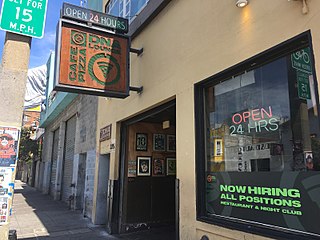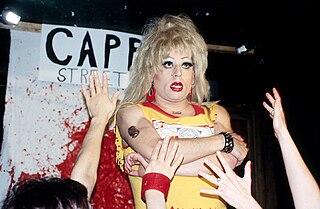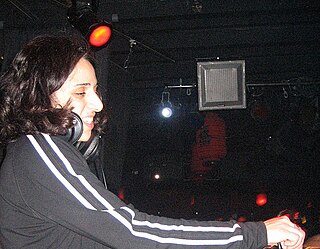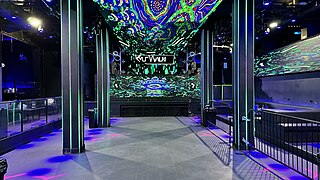Related Research Articles

DNA Lounge is an all-ages nightclub and restaurant/cafe in the SoMa district of San Francisco owned by Jamie Zawinski, a former Netscape programmer and open-source software hacker. The club features DJ dancing, live music, burlesque performances, and occasionally conferences, private parties, and film premieres.
The Essential Mix is a weekly radio show on BBC Radio 1 currently broadcast between 0:00 and 2:00 a.m. UK time on Saturday morning. Originally broadcast on 30 October 1993, the Essential Mix features contemporary DJs and music producers of electronic dance music. The show has been presented since its inception by Pete Tong and features an uninterrupted two-hour mix from a different artist each week, overlaid with occasional continuity announcements delivered by Tong. With a broadcast run of nearly 30 years, the Essential Mix is one of the longest-running programmes in the current BBC Radio 1 schedule. It is one of very few Radio 1 shows which is not broadcast live.

The Trocadero is a historic building located in San Francisco. Formally it was a lively roadhouse at the turn of the 20th century it had offered gambling at roulette tables and dancing, as well as the best trout pond in California.

Ryan Gary Raddon, better known by his stage name Kaskade, is an American DJ, music producer and remixer. DJ Times voted Kaskade "America's Best DJ" in 2011 and 2013. DJ Mag named Kaskade fifty-first on its 2009 list of Top 100 DJs.

Lee Presson and the Nails is a swing band that formed in San Francisco in October 1994 during the late 1990s swing revival.

Trannyshack was a San Francisco drag club started by drag queen Heklina in 1996 as an offshoot of Klubstitute, and was a weekly fixture at The Stud bar in San Francisco for 12 years, drawing large crowds on a regular basis. The Tuesday night performances at The Stud ended on 12 August 2008, with Trannyshack resuming as a monthly event at DNA Lounge in March 2010.

The EndUp is a nightclub in San Francisco, California. Opened in 1973, the club is located at 6th Street and Harrison in the South of Market district. Known for its status as an afterhours club, the venue has hosted a variety of benefits and events during its time as part of San Francisco's nightlife community.
The I-Beam was a former popular nightclub and live music venue active from 1977 to 1994, and located in the Park Masonic Hall building on the second floor at 1748 Haight Street in the Haight-Ashbury neighborhood of San Francisco. The I-Beam served as one of San Francisco's earliest disco clubs, as well as serving as a "gay refuge".

The Trocadero Transfer, or The Troc, was an after hours dance club in operation from December 1977 to the late–1990s in San Francisco, California, U.S.. It was located at 520 4th Street at Bryant in the SoMa neighborhood. The club has been compared to Studio 54 in New York City, and their patrons would travel from other cities to attend the party.
Bootie is the first club night in the United States dedicated solely to mashups and bootlegs, and was founded in San Francisco, California. It is now the biggest and longest running all-mashup party in the world, with regular parties in several cities.
The King Street Garage was a nightclub located at 174 King Street in San Francisco, California, near the present location of AT&T Park. It was directly adjacent to, and physically connected with, the Club Townsend, another famous nightclub on the other side of the block located at 177 Townsend Street.
Adrian & the Mysterious D were an American DJ duo who helped popularize mashup and bootleg music in America. The duo consisted of Adriana Roberts and Deidre Roberts. Based in San Francisco, the duo founded the Bootie club night in 2003, the first mashup bootleg party in the United States. In 2005, they started a sister Bootie club in Los Angeles, and in 2007, launched Bootie parties in New York City and Paris, and in 2008, Munich and Boston. Bootie Mashup parties and one-offs in other cities followed.

Dub Mission is a dub, dubstep, roots, and dancehall party which occurs weekly on Sunday nights at San Francisco's Elbo Room club in the Mission district. Started by DJ Sep in 1996 as a monthly venue to fill a void in the Bay Area's dub scene, Dub Mission has grown into a weekly event with a loyal fan base, and regularly features prominent dub and reggae musicians as guests. Resident DJs of Dub Mission include J Boogie, Ludichris, Vinnie Esparza, and Maneesh the Twister. Prominent stars who have performed at Dub Mission events include the Mad Professor, Adrian Sherwood, DJ Collage, Mungo's Hi Fi, Scientist, Tippa Irie, Twilight Circus Dub Sound System, and Tino Corp.
The Hubba Hubba Revue is a San Francisco–based neo-burlesque and variety show which opened in September 2006 and continues with weekly and monthly shows in San Francisco and Oakland.
Club Glow is the longest running electronic music event promoter on the East Coast and venue owner based in Washington, DC. Established in 1999, they currently operate venues Echostage and Soundcheck and host numerous large-scale events and music festivals at the DC Armory and RFK Stadium, including Project GLOW and Moonrise Music Festival. Club Glow regularly brings top international talent to Echostage, and in 2021 the venue obtained the first place in the world by DJ Magazine’s "Top 100 Clubs," and has been voted as “the best electronic music venue in North America” since 2017. Club Glow became a subsidiary of Insomniac Events in 2020 and the creative partnership has helped the company expand throughout the East Coast and beyond.

Kara Nova is a pole acrobat in the San Francisco Bay area, California.
The San Francisco Drag King Contest is an annual contest for drag kings held in San Francisco, California and founded by performer and producer, Fudgie Frottage. It is the biggest drag king contest in the world, and the longest running drag king competition in the U.S. The related International Drag King Community Extravaganza (IDKE) is the largest drag king performance event in the world but not a contest. The 26th Annual San Francisco Drag King Contest will be held Sunday, August 21st, 2022.
Afrolicious is a dance-fusion collective based in San Francisco, California. Founded by brothers Joe "Pleasuremaker" McGuire and Oz "Señor Oz" McGuire, the group's weekly residency at the Elbo Room in the Mission District has established Afrolicious as an integral player in the San Francisco live music scene. At its core Afrolicious consists of a DJ duo, but has since expanded to include a live band with as many as twelve pieces as well as a project known as Afrolicious Soundsystem. In addition to its reputation for regular touring, Afrolicious has released two EPs as well as a full-length original album.

Electrowerkz is a three-floor music venue in Islington, London. In addition to mainstream club nights, it hosts the regular goth night club Slimelight and many other club, live music and events.

Temple is a nightclub first established in San Francisco, with an additional location in Denver. With a San Francisco location south of Market Street near the Salesforce Tower and Transbay Transit Center, the club was opened in 2007 by entrepreneur Paul Hemming. Temple has been notable for being among the highest-grossing nightclubs by revenue in the San Francisco Bay Area in the early 2010s.
References
- 1 2 "Death Guild early history" . Retrieved 2011-11-04.
- ↑ "DNA Lounge: Facilities". 2012-10-06. Retrieved 2013-03-06.
- ↑ "DJ Lucretia on Death Guild". Archived from the original on August 7, 2009. Retrieved 2011-11-04.
- ↑ "DJ Melting Girl interview". SF Weekly. 1995-08-16. Retrieved 2011-11-04.
- ↑ "Death Guild's 1996 web site". Archived from the original on May 6, 2009. Retrieved 2011-11-04.
- ↑ "Trocadero troubles". SF Weekly. 1998-02-11. Retrieved 2011-11-04.[ permanent dead link ]
- ↑ "Death Guild leaves Trocadero". SF Weekly. 1997-03-26. Retrieved 2011-11-04.[ permanent dead link ]
- ↑ "Riff Raff: Melting Girl Molts". SF Weekly. 1997-07-09. Archived from the original on February 2, 2013. Retrieved 2011-11-04.
- ↑ "Death Guild is Moving". SFGoth Mailing List. 2003-06-08. Archived from the original on 2012-03-31. Retrieved 2011-11-04.
- ↑ "Death Guild is Moving Again". SFGoth Mailing List. 2003-10-10. Archived from the original on 2012-03-31. Retrieved 2011-11-04.
- ↑ "Death Guild Bids Adieu to Glas Kat". SF Weekly. 2008-10-15. Retrieved 2011-11-04.
- ↑ "Death Guild DJs" . Retrieved 2011-11-04.
- ↑ Evany Thomas (2001-07-16). "From Netscape to Nightclub". Wired Magazine. Archived from the original on 2007-02-08. Retrieved 2009-02-26.
- ↑ "DNA Lounge blog entry: "Wherein we are re-opening!"". 2021-05-15. Retrieved 2021-05-24.
- ↑ "DNA Lounge: Turbo Drive: 8th Anniversary, 18 Jun 2021 (Fri)" . Retrieved 2021-06-21.
- ↑ "DNA Lounge calendar: Death Guild, 21 Jun 2021 (Mon)" . Retrieved 2021-05-24.
- ↑ "Best of SF 2001". SF Weekly. 2001-05-23. Archived from the original on 2013-04-04. Retrieved 2011-11-04.
- ↑ "Best of the Bay 2020". 48 Hills. 2020-10-23. Retrieved 2020-12-22.
- ↑ "Best of the Bay 2021". 48 Hills. 2021-10-14. Retrieved 2022-01-13.